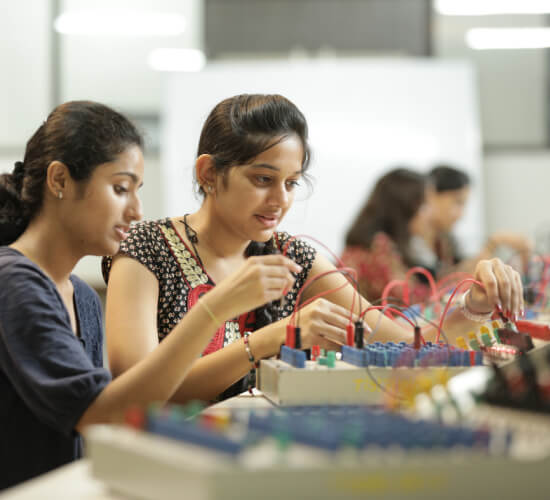Overview:
DEPARTMENT OF ELECTRICAL & ELECTRONICS ENGINEERING
The Department of Electrical & Electronics Engineering, SDM College of Engineering and Technology, Dharwad, was established in the year 1979 with inception of the institution with an initial intake of 30 seats which was further increased to 60 in 1993. The program has been approved by AICTE, accredited by NBA Tier-I 4th time (presently from July 2022 to June 2025), recognized as the research centre by VTU and has been granted Academic Autonomy status from 2007. The department also offers PG program in Power Systems Engineering with an intake of 18 since 2012. The department is starting new PG program in Electric Vehicle Technology jointly with Electronics & Communication Engineering and Mechanical Engineering Departments with the intake of 18 from academic year 2023-24.
- Year of Establishment: 1979
- Head of Department: Dr. Shekhappa G. Ankaliki
- NBA Accreditation Status: Academic Year 2018-19, 2019-20, 2020-21 and 2021-22, i.e., upto 30-06-2022; Further Accredited for Academic Year 2022-23, 2023-24 and 2024-25, i.e., upto 30/06/2025.
- Current Intake: 60
- Phone Number: 8073592308 | 0836-2328322/29


Vision:
To develop globally acceptable Electrical and Electronics Engineering professionals with human values.
Mission:
- Adopting the state of the art curricula.
- Practicing effective and innovative teaching-learning methodologies.
- Initiating complementary learning activities to enhance competence.
- Inculcating positive attitude and commitment to society.
PEOs & POs
Programme Educational Objectives(PEOs)
UG – Electrical & Electronics Engineering: PROGRAM EDUCATIONAL OUTCOMES (PEOs)
| PEO 1 | To impart the domain knowledge and soft skills to secure employment or become entrepreneur or pursue higher studies. |
| PEO 2 | To provide training for teamwork, leadership qualities, lifelong learning and adaptability to achieve professional growth. |
| PEO 3 | To develop sense of positive attitude and practice ethics to contribute positively to the society as a responsible citizen. |
Programme Outcomes(POs)
UG – Electrical & Electronics Engineering: PROGRAM OUTCOMES (POs)
Engineering Graduates will be able to:
| PO | Short Title of the PO | Description of the Programme Outcome (PO) Engineering Graduates will be able to: |
|---|---|---|
| PO-1 | Engineering knowledge | An ability to independently carry out research / investigation and development work to solve practical problems. |
| PO-2 | Problem analysis | An ability to write and present a substantial technical report / document. |
| PO-3 | Design/development of solutions | Student should be able to demonstrate a degree of mastery over the area ofPower SystemEngineering. |
| PO-4 | Conduct investigations of complex problems | Exposure to the state-of-the-art practices in the domain of power systems engineering |
| PO-5 | Modern tool usage | Create, select, and apply appropriate techniques, resources, and modern engineering and IT tools including prediction and modeling to complex engineering activities with an understanding of the limitations. |
| PO-6 | The engineer and society | Apply reasoning informed by the contextual knowledge to assess societal, health, safety, relevant to the professional engineering practice. |
| PO-7 | Environment and Sustainability | Understand the impact of professional engineering solutions in societal and environmental contexts, and demonstrate the knowledge of, and need for sustainable development. |
| PO-8 | Ethics | Apply ethical principles and commit to professional ethics responsibilities and norms of the engineering practice. |
| PO-9 | Individual and team work | Function effectively as an individual and as a member or leader in diverse teams and individual, and in multidisciplinary settings. |
| PO-10 | Communication | Communicate effectively on complex engineering activities with the engineering community and with society at large, such as, being able to comprehend and write effective reports and design documentation, make effective presentations, and give and receive clear instructions. |
| PO-11 | Project Management and Finance | Demonstrate knowledge and understanding of the engineering knowledge and management principles and apply these to one’s own work, as a member and leader in a team, to manage projects and in multidisciplinary environments. |
| PO-12 | Life-long Learning | Recognize the need for, and have the preparation and ability to engage in independent and lifelong learning in the broadest context of technological change. |
Programme Specific Outcomes (PSOs)
UG – Electrical & Electronics Engineering: PROGRAM SPECIFIC OUTCOMES(PSOs)
| PSO 1 | Enhancement of professional competence in cutting edge domain through value addition activities. |
| PSO 2 | Ability to demonstrate the skill of carrying out operation and Maintenance of electrical distribution system effectively. |
| PSO 3 | Design and implement the electronic circuits/programs for practical applications. |
Faculty

Dr. Ramesh L. Chakrasali
Professor

Dr. Shekhappa G. Ankaliki
Professor & HoD

Prof. Sunil Joshi
Associate Professor

Prof. Vishwakumar R Sheelavant
Assistant Professor

Dr. Basavaraj S Shalavadi
Assistant Professor

Prof. Prakash Gani
Assistant Professor

Prof. Nandakumara C.
Assistant Professor

Prof. Shravankumar Nayak
Assistant Professor

Prof. Manjula S Sureban
Assistant Professor

Prof. Megha G.Shidenur
Assistant Professor

Prof. Tejaswi M Timsani
Assistant Professor

Prof. Pradeep Vibhuti
Assistant Professor

Prof. Sanjeeth P Amminabhavi
Assistant Professor
Syllabus
| UG |
|
EEE I & II Sem Syllabus 2023-24(2023-27 Batch) EEE III & IV sem Syllabus 23-24 2022-26 batch EEE V & VI sem syllabus for 21-25 batch EEE VII & VIII sem 23-24 2020-24Batch |
Timetable
|
E&E II, IV, VI, VIII Semester Timetable |
Activities
|
Newsletter(2015 to 2023) EEE Research Centre Recognition Scholar List Status as on 26-01-2023 BOS (2019 – 2023) |
DUGC DPGC |
Department Tour
Infrastructure
|
Infrastructure |
3000 +
Students
160 +
Faculty
950 +
Placement
300 +
Support Staff
300 +
No. of Companies Visited
